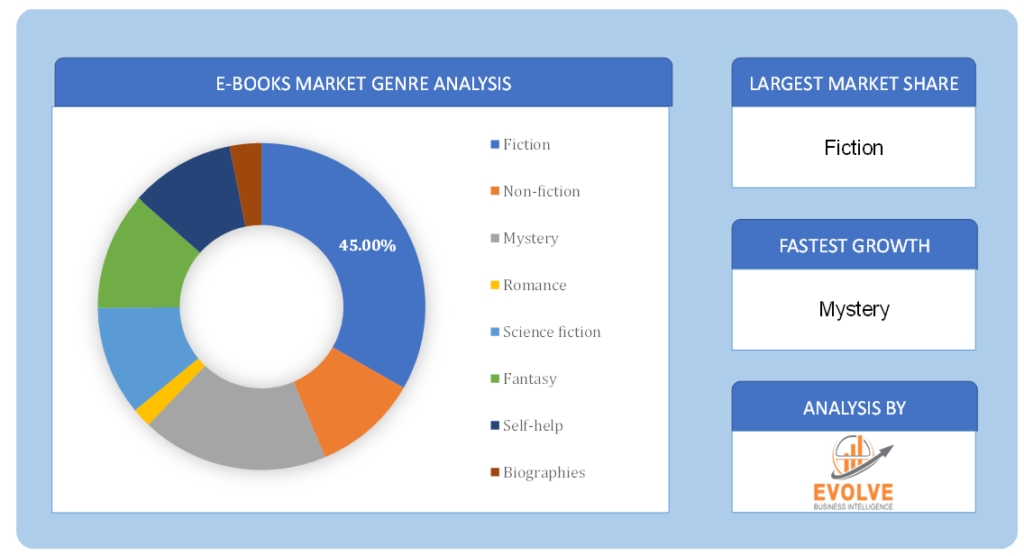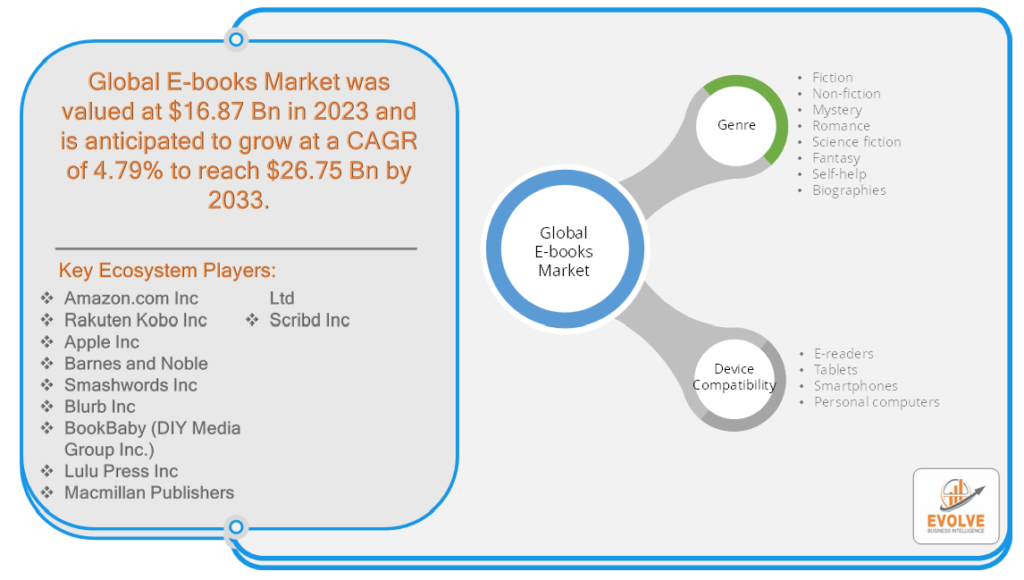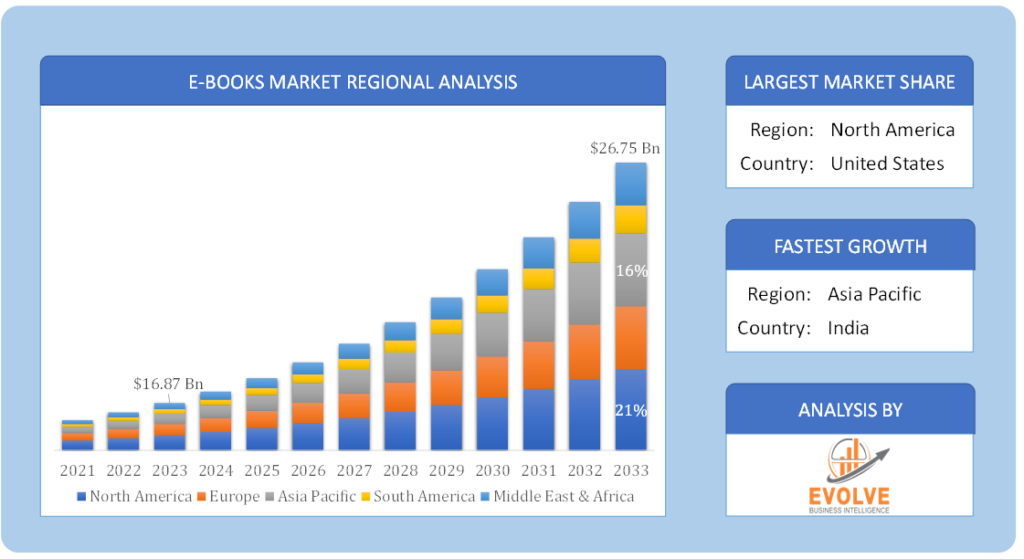E-books Market Analysis and Global Forecast 2023-2033
$ 1,390.00 – $ 5,520.00Price range: $ 1,390.00 through $ 5,520.00
E-books Market Research Report: Information By Genre (Fiction, Non-fiction, Mystery, Romance, Science fiction, Fantasy, Self-help, Biographies), By Device Compatibility (E-readers, Tablets, Smartphones, Personal computers), and by Region — Forecast till 2033
E-books Market Overview
The E-books Market Size is expected to reach USD 26.75 Billion by 2033. The E-books industry size accounted for USD 16.87 Billion in 2023 and is expected to expand at a compound annual growth rate (CAGR) of 4.79% from 2023 to 2033. E-books, short for electronic books, refer to digital publications that are designed to be read on electronic devices such as e-readers, tablets, smartphones, or computers. They are the digital counterparts of traditional printed books and offer a convenient and portable means of accessing and reading content. E-books typically come in various file formats such as PDF, EPUB, or MOBI, allowing users to adjust the text size, font, and other reading settings according to their preferences. E-books often feature interactive elements, such as hyperlinks, multimedia content, and searchable text, enhancing the reading experience and enabling easy navigation within the book. They can cover a wide range of topics and genres, including fiction, non-fiction, academic textbooks, reference materials, and more.
Global E-books Market Synopsis
The COVID-19 pandemic had a profound and transformative impact on the E-books market. As lockdowns and social distancing measures were implemented globally, physical bookstores faced closures, supply chain disruptions, and decreased foot traffic. This situation prompted a surge in demand for E-books as readers sought alternative ways to access and enjoy books from the safety of their homes. Publishers and authors quickly adapted to the changing landscape, accelerating the digital transformation of the industry. E-books became a lifeline for the publishing sector, enabling continuous sales, remote learning, and virtual events. The pandemic acted as a catalyst for the widespread adoption of E-books, leading to increased market penetration, the emergence of new publishing models, and the integration of innovative technologies to enhance the digital reading experience.
E-books Market Dynamics
The major factors that have impacted the growth of E-books are as follows:
Drivers:
Digital Transformation and Technological Advancements
The ongoing digital transformation and continuous technological advancements have been significant drivers for the E-books market. The increasing accessibility and affordability of electronic devices such as e-readers, tablets, and smartphones, along with the availability of high-speed internet, have expanded the potential audience for E-books. Additionally, the development of user-friendly E-book platforms, enhanced reading experiences, and interactive features have further boosted the appeal of digital books among consumers.
Restraint:
- Resistance to Change and Digital Divide
Despite the growing popularity of E-books, a significant portion of the population still prefers traditional printed books due to factors such as familiarity, nostalgia, and the tactile experience of physical books. Some readers also expressed concerns about digital distractions, eye strain, or screen time. Moreover, the digital divide remains a challenge in certain regions or demographic groups, where access to the necessary technology or reliable internet connections is limited, hindering the widespread adoption of E-books among these populations.
Opportunity:
Global Reach and Accessibility
One of the key opportunities for the E-books market lies in its ability to reach a global audience and overcome geographical barriers. E-books can be easily distributed and purchased online, enabling readers from different parts of the world to access content instantaneously. Additionally, E-books offer unique accessibility features such as adjustable fonts, text-to-speech functionalities, and screen readers, catering to individuals with visual impairments or reading difficulties, which further broadens the potential customer base. The ability to translate and offer E-books in multiple languages also presents a significant opportunity for publishers to tap into diverse markets and expand their readership.
E-books Segment Overview
By Genre
 Based on Genre, the market is segmented based on Fiction, Non-fiction, Mystery, Romance, Science fiction, Fantasy, Self-help, and Biographies. The Fiction segment is expected to have a larger market share throughout the forecast period. There are several factors contributing to this trend. Firstly, fiction books have always been popular among readers, and the transition to digital platforms has only amplified their reach and accessibility. Fiction covers a wide range of genres, including romance, mystery, science fiction, fantasy, and literary fiction, catering to diverse reader preferences. The availability of a vast selection of fiction titles in E-book format allows readers to easily explore and discover new authors, series, and sub-genres.
Based on Genre, the market is segmented based on Fiction, Non-fiction, Mystery, Romance, Science fiction, Fantasy, Self-help, and Biographies. The Fiction segment is expected to have a larger market share throughout the forecast period. There are several factors contributing to this trend. Firstly, fiction books have always been popular among readers, and the transition to digital platforms has only amplified their reach and accessibility. Fiction covers a wide range of genres, including romance, mystery, science fiction, fantasy, and literary fiction, catering to diverse reader preferences. The availability of a vast selection of fiction titles in E-book format allows readers to easily explore and discover new authors, series, and sub-genres.
By Device Compatibility
Based on Device Compatibility, the market has been divided into E-readers, Tablets, Smartphones, and Personal computers. The Tablets segment is anticipated to dominate the market. While tablets offer a versatile reading experience with their larger screens, color displays, and multimedia capabilities, e-readers have also gained a significant market share due to their specialized features designed specifically for reading, such as e-ink displays that mimic the appearance of paper, long battery life, and reduced eye strain.
Global E-books Market Regional Analysis
Based on region, the global E-books market has been divided into North America, Europe, Asia-Pacific, the Middle East & Africa, and Latin America. North America is projected to dominate the use of the E-books market followed by the Asia-Pacific and Europe regions.
 North America Market
North America Market
North America has historically held a dominant position in the E-books market. The region’s strong position can be attributed to several factors. Firstly, North America has a high level of internet penetration and digital literacy, creating a favorable environment for the adoption of digital reading platforms and E-books. Additionally, the presence of major publishing houses, technological advancements, and the availability of established E-book distribution channels have contributed to the region’s dominance. Furthermore, North America has a large and diverse reader base with a strong demand for E-books across various genres and categories. The region’s well-developed e-commerce infrastructure, along with the widespread availability of e-readers, tablets, and smartphones, has facilitated the growth of the E-books market. North American consumers have also embraced digital reading, driven by factors such as convenience, cost-effectiveness, and the ability to carry a vast library of books in a single device.
Asia-Pacific Market
The Asia-Pacific region has emerged as a rapidly growing market for the E-books industry. Several factors have contributed to this growth. Firstly, the region has a large and diverse population, with a rising middle class and increasing digital literacy. This has created a significant consumer base with a growing demand for digital content, including E-books. Moreover, the widespread adoption of smartphones and improving internet infrastructure have made accessing E-books more convenient and affordable for a larger portion of the population. The Asia-Pacific region has experienced a surge in smartphone penetration, providing individuals with a portable reading device and access to E-book platforms and reading apps.
Competitive Landscape
The Global E-books market is highly competitive, with numerous players offering a wide range of software solutions. The competitive landscape is characterized by the presence of established companies, as well as emerging startups and niche players. To increase their market position and attract a wide consumer base, the businesses are employing various strategies, such as product launches, and strategic alliances.
Prominent Players:
- com Inc
- Rakuten Kobo Inc
- Apple Inc
- Barnes and Noble
- Smashwords Inc
- Blurb Inc
- BookBaby (DIY Media Group Inc.)
- Lulu Press Inc
- Macmillan Publishers Ltd
- Scribd Inc
Key Development
In March 2022, Lulu.com introduced Lulu Direct, a new feature on their publishing platform that offered writers the convenience of print-on-demand and direct-to-consumer sales channels. This innovative technology was seamlessly integrated with popular e-commerce platforms like Shopify and WooCommerce, simplifying the management of sales, fulfillment, and supply chain logistics for authors and artists.
In January 2022, Hachette UK acquired Paperblanks, the world’s second-largest publisher of premium notebooks, journals, and diaries, following Moleskine. This acquisition was finalized on January 14, 2022, with Hachette UK obtaining complete ownership of the company by purchasing all of its shares.
Scope of the Report
Global E-books Market, by Genre
- Fiction
- Non-fiction
- Mystery
- Romance
- Science fiction
- Fantasy
- Self-help
- Biographies
Global E-books Market, by Device Compatibility
- E-readers
- Tablets
- Smartphones
- Personal computers
Global E-books Market, by Region
- North America
- US
- Canada
- Mexico
- Europe
- UK
- Germany
- France
- Italy
- Spain
- Benelux
- Nordic
- Rest of Europe
- Asia Pacific
- China
- Japan
- South Korea
- Indonesia
- Austalia
- Malaysia
- India
- Rest of Asia Pacific
- South America
- Brazil
- Argentina
- Rest of South America
- Middle East & Africa
- Saudi Arabia
- UAE
- Egypt
- South Africa
- Rest of Middle East & Africa
| Parameters | Indicators |
|---|---|
| Market Size | 2033: $26.75 Billion |
| CAGR | 4.79% CAGR (2023-2033) |
| Base year | 2022 |
| Forecast Period | 2023-2033 |
| Historical Data | 2021 |
| Report Coverage | Revenue Forecast, Competitive Landscape, Growth Factors, and Trends |
| Key Segmentations | Genre, Device Compatibility |
| Geographies Covered | North America, Europe, Asia-Pacific, Latin America, Middle East, Africa |
| Key Vendors | Amazon.com Inc, Rakuten Kobo Inc, Apple Inc, Barnes and Noble, Smashwords Inc, Blurb Inc, BookBaby (DIY Media Group Inc.), Lulu Press Inc, Macmillan Publishers Ltd, Scribd Inc |
| Key Market Opportunities | • Global Reach and Accessibility |
| Key Market Drivers | • Digital Transformation and Technological Advancements • Increased accessibility and affordability of electronic devices |
REPORT CONTENT BRIEF:
- High-level analysis of the current and future E-books market trends and opportunities
- Detailed analysis of current market drivers, restraining factors, and opportunities in the future
- E-books market historical market size for the year 2021, and forecast from 2023 to 2033
- E-books market share analysis at each product level
- Competitor analysis with detailed insight into its product segment, Government & Defense strength, and strategies adopted.
- Identifies key strategies adopted including product launches and developments, mergers and acquisitions, joint ventures, collaborations, and partnerships as well as funding taken and investment done, among others.
- To identify and understand the various factors involved in the global E-books market affected by the pandemic
- To provide a detailed insight into the major companies operating in the market. The profiling will include the Government & Defense health of the company’s past 2-3 years with segmental and regional revenue breakup, product offering, recent developments, SWOT analysis, and key strategies.
Frequently Asked Questions (FAQ)
The study period of the global E-books market is 2021- 2033
The Global E-books market is growing at a CAGR of 4.79% over the next 10 years
Asia Pacific is expected to register the highest CAGR during 2023-2033
North America holds the largest share in 2022
Amazon com Inc, Rakuten Kobo Inc, Apple Inc, Barnes and Noble, Smashwords Inc, Blurb Inc, BookBaby (DIY Media Group Inc.), Lulu Press Inc, Macmillan Publishers Ltd, Scribd Inc are the major companies operating in the market.
Yes, we offer 16 hours of analyst support to solve the queries
Yes, we provide regional as well as country-level reports. Other than this we also provide a sectional report. Please get in contact with our sales representatives.
Press Release

Global Pharmaceutical Manufacturing Market to Reach $1.38 Trillion by 2035 with 7.35% CAGR, New Research Shows

The Global Mammography Market Is Estimated To Record a CAGR of Around 10.29% During The Forecast Period

Glue Stick Market to Reach USD 2.35 Billion by 2034

Podiatry Service Market to Reach USD 11.88 Billion by 2034

Microfluidics Technology Market to Reach USD 32.58 Billion by 2034

Ferric Chloride Market to Reach USD 10.65 Billion by 2034

Family Practice EMR Software Market to Reach USD 21.52 Billion by 2034

Electric Hairbrush Market to Reach USD 15.95 Billion by 2034

Daily Bamboo Products Market to Reach USD 143.52 Billion by 2034

Cross-border E-commerce Logistics Market to Reach USD 112.65 Billion by 2034
Table of Content
Chapter 1. Executive Summary Chapter 2. Scope Of The Study 2.1. Market Definition 2.2. Scope Of The Study 2.2.1. Objectives of Report 2.2.2. Limitations 2.3. Market Structure Chapter 3. Evolve BI Methodology Chapter 4. Market Insights and Trends 4.1. Supply/ Value Chain Analysis 4.1.1. Raw Material Providers 4.1.2. Manufacturing Process 4.1.3. Distributors/Retailers 4.1.4. End-Use Industry 4.2. Porter’s Five Forces Analysis 4.2.1. Threat Of New Entrants 4.2.2. Bargaining Power Of Buyers 4.2.3. Bargaining Power Of Suppliers 4.2.4. Threat Of Substitutes 4.2.5. Industry Rivalry 4.3. Impact Of COVID-19 on the E-books Market 4.3.1. Impact on Market Size 4.3.2. End-Use Industry Trend, Preferences, and Budget Impact 4.3.3. Regulatory Framework/Government Policies 4.3.4. Key Players' Strategy to Tackle Negative Impact 4.3.5. Opportunity Window 4.4. Technology Overview 12.28. Macro factor 4.6. Micro Factor 4.7. Demand Supply Gap Analysis of the E-books Market 4.8. Import Analysis of the E-books Market 4.9. Export Analysis of the E-books Market Chapter 5. Market Dynamics 5.1. Introduction 5.2. DROC Analysis 5.2.1. Drivers 5.2.2. Restraints 5.2.3. Opportunities 5.2.4. Challenges 5.3. Patent Analysis 5.4. Industry Roadmap 5.5. Parent/Peer Market Analysis Chapter 6. Global E-books Market, By Genre 6.1. Introduction 6.2. Fiction 6.3. Non-fiction 6.4. Mystery 6.5. Romance 6.6. Science fiction 6.7. Fantasy 6.8. Self-help 6.9. Biographies Chapter 7. Global E-books Market, By Device Compatibility 7.1. Introduction 7.2. E-readers 7.3. Tablets 7.4. Smartphones 7.5. Personal computers Chapter 8. Global E-books Market, By Region 8.1. Introduction 8.2. North America 8.2.1. Introduction 8.2.2. Driving Factors, Opportunity Analyzed, and Key Trends 8.2.3. Market Size and Forecast, By Country, 2023-2033 8.2.4. Market Size and Forecast, By Genre, 2023-2033 8.2.5. Market Size and Forecast, By Device Compatibility, 2023-2033 8.2.6. US 8.2.6.1. Introduction 8.2.6.2. Driving Factors, Opportunity Analyzed, and Key Trends 8.2.6.3. Market Size and Forecast, By Genre, 2023-2033 8.2.6.4. Market Size and Forecast, By Device Compatibility, 2023-2033 8.2.7. Canada 8.2.7.1. Introduction 8.2.7.2. Driving Factors, Opportunity Analyzed, and Key Trends 8.2.7.4. Market Size and Forecast, By Genre, 2023-2033 8.2.7.5. Market Size and Forecast, By Device Compatibility, 2023-2033 8.3. Europe 8.3.1. Introduction 8.3.2. Driving Factors, Opportunity Analyzed, and Key Trends 8.3.3. Market Size and Forecast, By Country, 2023-2033 8.3.4. Market Size and Forecast, By Genre, 2023-2033 8.3.5. Market Size and Forecast, By Device Compatibility, 2023-2033 8.3.6. Germany 8.3.6.1. Introduction 8.3.6.2. Driving Factors, Opportunity Analyzed, and Key Trends 8.3.6.3. Market Size and Forecast, By Genre, 2023-2033 8.3.6.4. Market Size and Forecast, By Device Compatibility, 2023-2033 8.3.7. France 8.3.7.1. Introduction 8.3.7.2. Driving Factors, Opportunity Analyzed, and Key Trends 8.3.7.3. Market Size and Forecast, By Genre, 2023-2033 8.3.7.4. Market Size and Forecast, By Device Compatibility, 2023-2033 8.3.8. UK 8.3.8.1. Introduction 8.3.8.2. Driving Factors, Opportunity Analyzed, and Key Trends 8.3.8.3. Market Size and Forecast, By Genre, 2023-2033 8.3.8.4. Market Size and Forecast, By Device Compatibility, 2023-2033 8.3.9. Italy 8.3.9.1. Introduction 8.3.9.2. Driving Factors, Opportunity Analyzed, and Key Trends 8.3.9.3. Market Size and Forecast, By Genre, 2023-2033 8.3.9.4. Market Size and Forecast, By Device Compatibility, 2023-2033 8.3.11. Rest Of Europe 8.3.11.1. Introduction 8.3.11.2. Driving Factors, Opportunity Analyzed, and Key Trends 8.3.11.3. Market Size and Forecast, By Genre, 2023-2033 8.3.11.4. Market Size and Forecast, By Device Compatibility, 2023-2033 8.4. Asia-Pacific 8.4.1. Introduction 8.4.2. Driving Factors, Opportunity Analyzed, and Key Trends 8.4.3. Market Size and Forecast, By Country, 2023-2033 8.4.4. Market Size and Forecast, By Genre, 2023-2033 8.12.28. Market Size and Forecast, By Device Compatibility, 2023-2033 8.4.6. China 8.4.6.1. Introduction 8.4.6.2. Driving Factors, Opportunity Analyzed, and Key Trends 8.4.6.3. Market Size and Forecast, By Genre, 2023-2033 8.4.6.4. Market Size and Forecast, By Device Compatibility, 2023-2033 8.4.7. India 8.4.7.1. Introduction 8.4.7.2. Driving Factors, Opportunity Analyzed, and Key Trends 8.4.7.3. Market Size and Forecast, By Genre, 2023-2033 8.4.7.4. Market Size and Forecast, By Device Compatibility, 2023-2033 8.4.8. Japan 8.4.8.1. Introduction 8.4.8.2. Driving Factors, Opportunity Analyzed, and Key Trends 8.4.8.3. Market Size and Forecast, By Genre, 2023-2033 8.4.8.4. Market Size and Forecast, By Device Compatibility, 2023-2033 8.4.9. South Korea 8.4.9.1. Introduction 8.4.9.2. Driving Factors, Opportunity Analyzed, and Key Trends 8.4.9.3. Market Size and Forecast, By Genre, 2023-2033 8.4.9.4. Market Size and Forecast, By Device Compatibility, 2023-2033 8.4.10. Rest Of Asia-Pacific 8.4.10.1. Introduction 8.4.10.2. Driving Factors, Opportunity Analyzed, and Key Trends 8.4.10.3. Market Size and Forecast, By Genre, 2023-2033 8.4.10.4. Market Size and Forecast, By Device Compatibility, 2023-2033 8.5. Rest Of The World (RoW) 8.5.1. Introduction 8.5.2. Driving Factors, Opportunity Analyzed, and Key Trends 8.5.3. Market Size and Forecast, By Genre, 2023-2033 8.5.4. Market Size and Forecast, By Device Compatibility, 2023-2033 Chapter 9. Company Landscape 9.1. Introduction 9.2. Vendor Share Analysis 9.3. Key Development Analysis 9.4. Competitor Dashboard Chapter 10. Company Profiles 10.1. Amazon.com Inc 10.1.1. Business Overview 10.1.2. Government & Defense Analysis 10.1.2.1. Government & Defense – Existing/Funding 10.1.3. Product Portfolio 10.1.4. Recent Development and Strategies Adopted 10.1.5. SWOT Analysis 10.2. Rakuten Kobo Inc 10.2.1. Business Overview 10.2.2. Government & Defense Analysis 10.2.2.1. Government & Defense – Existing/Funding 10.2.3. Product Portfolio 10.2.4. Recent Development and Strategies Adopted 10.2.5. SWOT Analysis 10.3. Apple Inc 10.3.1. Business Overview 10.3.2. Government & Defense Analysis 10.3.2.1. Government & Defense – Existing/Funding 10.3.3. Product Portfolio 10.3.4. Recent Development and Strategies Adopted 10.3.5. SWOT Analysis 10.4. Barnes and Noble 10.4.1. Business Overview 10.4.2. Government & Defense Analysis 10.4.2.1. Government & Defense – Existing/Funding 10.4.3. Product Portfolio 10.4.4. Recent Development and Strategies Adopted 10.12.28. SWOT Analysis 10.5. Smashwords Inc 10.5.1. Business Overview 10.5.2. Government & Defense Analysis 10.5.2.1. Government & Defense – Existing/Funding 10.5.3. Product Portfolio 10.5.4. Recent Development and Strategies Adopted 10.5.5. SWOT Analysis 10.6. Blurb Inc 10.6.1. Business Overview 10.6.2. Government & Defense Analysis 10.6.2.1. Government & Defense – Existing/Funding 10.6.3. Product Portfolio 10.6.4. Recent Development and Strategies Adopted 10.6.5. SWOT Analysis 10.7. BookBaby (DIY Media Group Inc.) 10.7.1. Business Overview 10.7.2. Government & Defense Analysis 10.7.2.1. Government & Defense – Existing/Funding 10.7.3. Product Portfolio 10.7.4. Recent Development and Strategies Adopted 10.7.5. SWOT Analysis 10.8 Lulu Press Inc 10.8.1. Business Overview 10.8.2. Government & Defense Analysis 10.8.2.1. Government & Defense – Existing/Funding 10.8.3. Product Portfolio 10.8.4. Recent Development and Strategies Adopted 10.8.5. SWOT Analysis 10.9 Macmillan Publishers Ltd 10.9.1. Business Overview 10.9.2. Government & Defense Analysis 10.9.2.1. Government & Defense – Existing/Funding 10.9.3. Product Portfolio 10.9.4. Recent Development and Strategies Adopted 10.9.5. SWOT Analysis 10.10. Scribd Inc 10.10.1. Business Overview 10.10.2. Government & Defense Analysis 10.10.2.1. Government & Defense – Existing/Funding 10.10.3. Product Portfolio 10.10.4. Recent Development and Strategies Adopted 10.10.5. SWOT Analysis
Connect to Analyst
Research Methodology

Our Most Viewed Report and gain instant expertise
Digital Remittance Market Analysis and Global Forecast 2024-2034
Digital Remittance Market Research Report: Information By Type (Inward Digital Remittance, Outward Digital Remittance), By Channel (Banks, Money Transfer Operators, Online Platform, Others), By End-Users (Migrant Labor Workforce, Personal, Small Businesses, Others), and by Region — Forecast till 2034
Page: 121Document Reader Market Analysis and Global Forecast 2023 – 2033
PRESS RELEASE :https://evolvebi.com/document-reader-market-is-estimated-to-record-a-cagr-of-around-7-29-during-the-forecast-period/
E-Learning Market Analysis and Global Forecast 2023-2033
E-Learning Market Research Report: By Technology (Online E-Learning, Learning Management System (LMS), Mobile E-Learning, Rapid E-Learning, Virtual Classroom, Others), By Application (Academic, Corporate, Government), By Provider (Services, Content), and by Region — Forecast till 2033
Page: 144Global & Australia Vocational Training Market Analysis and Global Forecast 2024-2034
Global & Australia Vocational Training Market Research Report: Information By Type (Accredited, Non-Accredited), by Program Type (High School programs, Tech Prep Education, Postsecondary Vocational School, Apprenticeship Programs, On-the-job Training, Others), by RTO Types (Private RTOs, TAFE Institutes, Community RTOs, Schools, Enterprise RTOs, Universities), and by Region — Forecast till 2034
Page: 55Global Career & Education Counselling Market Analysis and Forecast 2020-2028
Global Commercial Aquarium Market Analysis and Global Forecast 2021-2034
Global Commercial Aquarium Market Research Report: Information By Type (Inland, Ocean, Comprehensive), By Application (Male, Female, Kids), and by Region — Forecast till 2034
Page: 93Hard-Surface Flooring Market Analysis and Global Forecast 2023-2033
Hard-Surface Flooring Market Research Report: Information by Type (Ceramic Flooring, Wood and Laminate Flooring, Vinyl Flooring, Other), By Application (Residential Buildings, Nonresidential Buildings, Transportation), and by Region — Forecast till 2033
PRESS RELEASE: https://evolvebi.com/hard-surface-flooring-market-is-estimated-to-record-a-cagr-of-around-5-12-during-the-forecast-period/





